
Safety Last! is a 1923 American silent romantic-comedy film starring Harold Lloyd. It includes one of the most famous images from the silent-film era: Lloyd clutching the hands of a large clock as he dangles from the outside of a skyscraper above moving traffic. The film was highly successful and critically hailed, and it cemented Lloyd's status as a major figure in early motion pictures. It is still popular at revivals, and it is viewed today as one of the great film comedies.

Harold Clayton Lloyd Sr. was an American actor, comedian, and stunt performer who appeared in many silent comedy films.

Harold Brent Wallis was an American film producer. He is best known for producing Casablanca (1942), The Adventures of Robin Hood (1938), and True Grit (1969), along with many other major films for Warner Bros. featuring such film stars as Humphrey Bogart, John Wayne, Bette Davis, and Errol Flynn. As a producer, he received 19 nominations for the Academy Award for Best Picture.
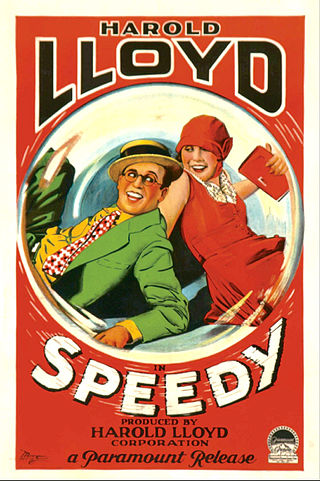
Speedy is a 1928 American sound part-talkie comedy film starring comedian Harold Lloyd in the eponymous leading role. It was Lloyd's last silent film to be released theatrically. Due to the general public's apathy towards silent films, a sound version was prepared and released in the latter half of 1928. In addition to sequences with audible dialogue or talking sequences, the film features a synchronized musical score and sound effects along with English intertitles. The soundtrack was recorded using the Western Electric sound-on-film system.

Jobyna Ralston was an American stage and film actress. She had a featured role in Wings in 1927, and is remembered for her on-screen chemistry with Harold Lloyd, with whom she appeared in seven films.

Girl Shy is a 1924 romantic comedy silent film starring Harold Lloyd and Jobyna Ralston. The movie was written by Sam Taylor, Tim Whelan and Ted Wilde and was directed by Fred C. Newmeyer and Taylor. In 2020, the film entered the public domain.
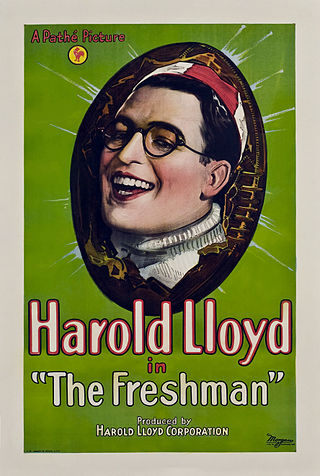
The Freshman is a 1925 American silent comedy film that tells the story of a college freshman trying to become popular by joining the school football team. It stars Harold Lloyd, Jobyna Ralston, Brooks Benedict, and James Anderson. It remains one of Lloyd's most successful and enduring films.

Movie Crazy is a 1932 American Pre-Code comedy film starring Harold Lloyd in his third sound feature.

Hot Water is a 1924 American silent comedy film directed by Fred C. Newmeyer and Sam Taylor and starring Harold Lloyd. It features three episodes in the life of Hubby (Lloyd) as he struggles with domestic life with Wifey and his in-laws.

The Man Who Played God is a 1932 American pre-Code drama film produced by Darryl F. Zanuck and directed by John G. Adolfi. George Arliss stars as a concert pianist embittered by the loss of his hearing, who eventually finds redemption by helping others; it also features a then little-known Bette Davis as the much younger woman engaged to the protagonist.
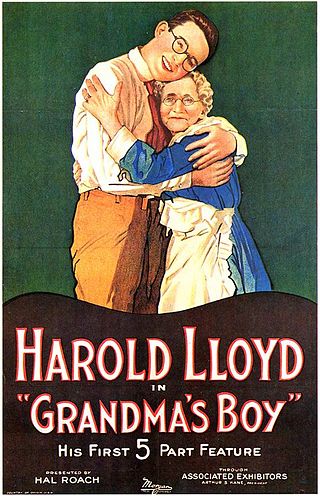
Grandma's Boy is a 1922 family comedy film starring Harold Lloyd. The film was highly influential, helping to pioneer feature-length comedies which combined gags with character development. This film was immensely popular, commercially successful film in its time.

The Sin of Harold Diddlebock is a 1947 American comedy film written and directed by Preston Sturges, starring the silent film comic icon Harold Lloyd, and featuring a supporting cast including female protagonist Frances Ramsden, Jimmy Conlin, Raymond Walburn, Rudy Vallee, Arline Judge, Edgar Kennedy, Franklin Pangborn, J. Farrell MacDonald, Robert Dudley, Robert Greig, Lionel Stander and Jackie the Lion. The film's story is a continuation of The Freshman (1925), one of Lloyd's most successful movies.

James Donlan was an American actor. Born in San Francisco, California, Donlan appeared in 107 films between 1929 and 1939. He was the father of actress Yolande Donlan.

Her Double Life is a 1916 American silent drama film directed by J. Gordon Edwards and starring Theda Bara. It is based on the Mary Murillo's story The New Magdalen, who also wrote the scenario. The film is now considered lost.
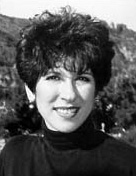
Annette Marie Lloyd is a silent film historian and author of numerous books on silent film and television, particularly on the life and works of actor Harold Lloyd.
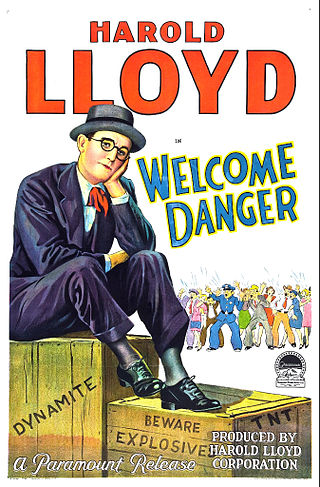
Welcome Danger is a 1929 American pre-Code comedy film directed by Clyde Bruckman and starring Harold Lloyd. A sound version and silent version were filmed. Ted Wilde began work on the silent version, but became ill and was replaced by Bruckman.
Secret Orders is a lost 1926 American silent drama film directed by Chester Withey and starring Harold Goodwin, Robert Frazer, and Evelyn Brent. The film was set in World War I and contained what the Chester Times described as a "world of swift-flowing melodrama.

Laura Eugenia Bayley was a British actress and filmmaker, active in the Brighton School of early cinema pioneers. Born in Ramsgate, Bayley performed onstage in Victorian burlesques, revues, and pantomimes, often with her three sisters. After marrying the showman George Albert Smith, she entered the world of early experiments with motion picture film; she played main roles in many of the most important films Smith made between 1897 and 1903, including The Kiss in the Tunnel (1899) and Mary Jane's Mishap (1903).

Sweet Lavender is a 1920 American silent drama film directed by Paul Powell and starring Mary Miles Minter. The scenario was adapted by Beulah Marie Dix from the 1888 play of the same name by Arthur Wing Pinero. Like many of Minter's features, it is thought to be a lost film.

Breakers Ahead is a 1918 American silent drama film, directed by Charles Brabin. It stars Viola Dana, Clifford Bruce, and Mabel Van Buren, and was released on March 25, 1918.



















